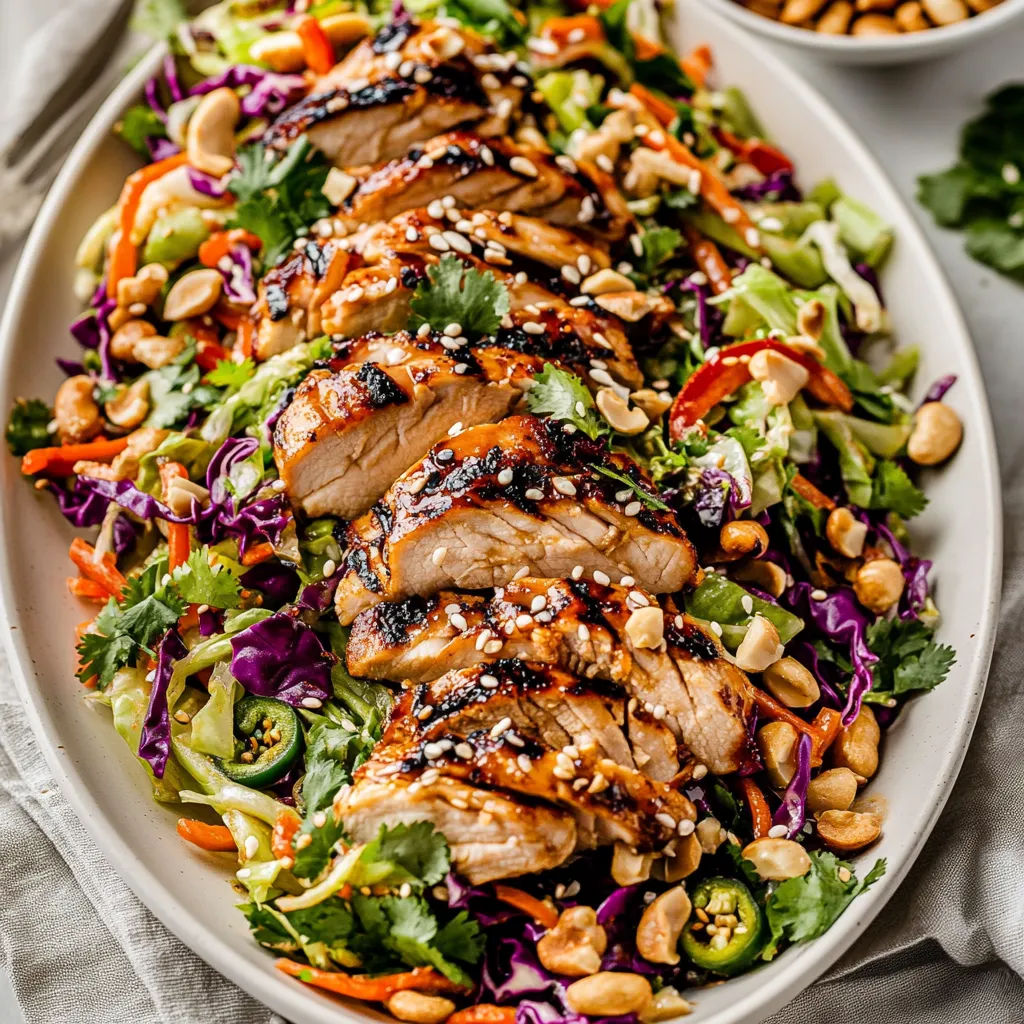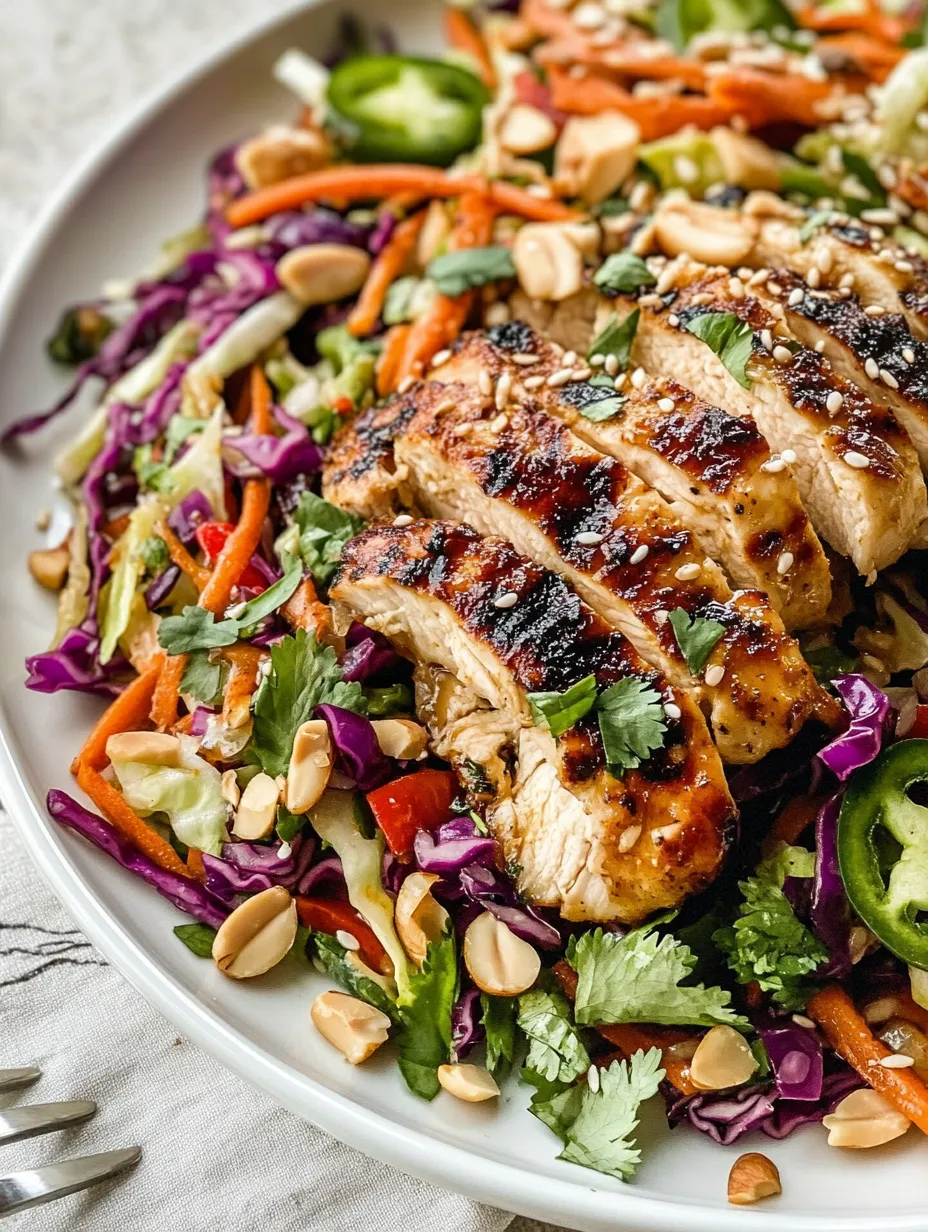 Pin it
Pin it
Rainbow-hued vegetables form a vibrant bed for tender sesame chicken in this crunchy salad that delivers a perfect balance of sweet, savory, and spicy in every forkful. Each bite offers a symphony of textures—crisp cabbage, juicy chicken, crunchy nuts—all unified by a silky sesame ginger dressing that clings to every ingredient. I created this recipe during a particularly busy week when I needed something satisfying yet refreshing, and it's since become my go-to for transforming leftover chicken into something that feels completely new and exciting.
The first time I served this salad to my team after we perfected the recipe, I watched as everyone fell silent, focused entirely on the explosion of flavors and textures in each bite. What began as a practical way to repurpose leftover grilled chicken has become a recipe that friends and colleagues request by name. Even my vegetable-resistant nephew helped himself to seconds, proof that the right combination of flavors and textures can win over even the most selective eaters.
Fresh Components
- Cabbage: Both red and green varieties create visual appeal while providing substantial crunch; slice thinly for the most pleasant texture
- Carrots: Their natural sweetness balances the savory elements; julienne for elegant presentation and consistent texture
- Bell peppers: Red offers the most sweetness and visual contrast; cut into thin strips that echo the cabbage's shape
- Jalapeño: Adds gentle heat that wakes up your palate; remove seeds for milder flavor or leave them for extra kick
- Green onions: Provide subtle allium flavor without overwhelming; slice on a bias for more surface area and visual interest
- Cilantro: Fresh leaves offer brightness that cuts through rich elements; include tender stems for additional flavor
- Sesame chicken: Marinated and grilled for maximum flavor; the caramelization from grilling adds sweet notes that complement the dressing
- Toasted nuts: Both almonds and cashews offer protein and satisfying crunch; toasting enhances their natural flavors
- Sesame seeds: These tiny powerhouses add visual appeal, subtle crunch, and reinforce the sesame notes in the dressing
Creation Method
Vegetable Preparation
Slice all vegetables thinly and consistently for balanced texture throughout the salad. This careful cutting ensures that each forkful contains a perfect mix of ingredients without any single element dominating. The thinness of the vegetables allows the dressing to coat each piece thoroughly, distributing flavor evenly while maintaining the essential crunch that makes this salad so satisfying.
Dressing Development
Balance sweet, salty, tangy, and umami elements in the sesame ginger dressing, tasting and adjusting until perfect harmony is achieved. The combination of nutty sesame oil, bright rice vinegar, savory soy sauce, and aromatic ginger creates a dressing that's far more complex than the sum of its parts. This careful calibration ensures the dressing enhances rather than masks the natural flavors of the vegetables and chicken.
Protein Integration
Slice grilled sesame chicken against the grain for maximum tenderness, allowing it to cool slightly before adding to the salad. This thoughtful handling prevents the chicken from wilting the vegetables while ensuring each piece carries the full flavor of its marinade. The slightly warm chicken gently softens the cabbage just enough to make it perfectly crisp-tender without becoming soggy.
Textural Contrast
Add toasted nuts and seeds last to maintain their crunch, distributing them throughout the layers rather than just on top. This strategic placement ensures textural interest in every bite rather than creating a separate crunchy layer. The variation in size between sliced almonds, whole cashews, and tiny sesame seeds creates multiple dimensions of crunch that keep each forkful interesting.
 Pin it
Pin it
Tossing Technique
Use a gentle lifting motion with tongs or your hands rather than aggressive stirring to combine ingredients. This careful tossing maintains the integrity of delicate components while ensuring even distribution of dressing. Allow the salad to rest briefly after tossing, permitting the flavors to meld while the cabbage maintains its essential crunch.
Growing up in a household where tossed salads meant iceberg lettuce and bottled ranch dressing, discovering the world of dynamic, vegetable-forward salads was a revelation that transformed my approach to eating. This particular recipe represents the culmination of lessons learned through travel and experimentation—the importance of textural contrast I discovered in Thailand, the power of balancing sweet-savory-spicy elements from Korean cuisine, and the satisfaction of a truly complete meal in a single bowl that I found in California. There's something deeply satisfying about creating a dish that nourishes completely while providing genuine pleasure with every bite.
Serving Suggestions
This versatile salad adapts beautifully to various serving styles and occasions. For casual family dinners, serve in a large wooden bowl family-style, allowing everyone to appreciate the vibrant colors before diving in. During summer gatherings, portion into individual glass bowls set atop larger plates to catch any escaped pieces while creating an elegant presentation. For meal prep, layer components in mason jars with dressing at the bottom and cabbage at the top, creating a practical yet Instagram-worthy lunch option. For dinner parties, serve small portions in lettuce cups as a starter that hints at Asian-inspired flavors to come.
 Pin it
Pin it
Creative Variations
My kitchen experiments have yielded several adaptations worth exploring. Create a tropical version by adding diced mango and substituting lime juice for some of the rice vinegar in the dressing, creating a sweeter profile with citrus brightness. For a heartier take, add cooked and cooled rice noodles or ramen, reducing the vegetable quantity slightly to maintain proper balance. Those seeking additional plant-based protein might appreciate adding edamame or marinated tofu cubes, creating a completely vegetarian version that sacrifices nothing in flavor or satisfaction.
Meal Prep Wisdom
Maximize this salad's convenience through strategic advance preparation. Chop all vegetables up to two days ahead, storing them in an airtight container with a paper towel to absorb excess moisture. The dressing keeps beautifully for up to a week in a sealed jar in the refrigerator. For the freshest experience when meal prepping, store components separately—vegetables in one container, protein in another, dressing in a small jar, and crunchy toppings in a snack bag—combining them just before eating or in the morning before work.
After years of making this salad in countless variations, I've come to appreciate not just its flavor but its remarkable versatility and staying power. What began as a solution for using leftover chicken has become a staple in my weekly rotation that adapts to whatever ingredients I have on hand. There's something deeply satisfying about creating a dish that offers complete nutrition while genuinely delighting the senses—proof that healthful eating needn't feel like deprivation but can instead be one of the day's highlights.
This sesame chicken cabbage salad represents what I love most about cooking—transforming simple ingredients into something far greater than their parts through thoughtful combination and preparation. It reminds us that extraordinary meals don't require exotic ingredients or complicated techniques, just respect for quality components and understanding of how flavors and textures work together. Whether you're seeking a satisfying lunch option or a fresh dinner idea, this vibrant salad delivers both nutritional balance and genuine eating pleasure.
Frequently Asked Questions
- → Can I make this salad ahead of time?
- Yes! This cabbage-based salad holds up extremely well in the refrigerator. You can prepare all the components up to 3 days ahead and store them separately. For best results, add the dressing and nuts just before serving to maintain maximum crunch. If you need to fully assemble in advance, the dressed salad will keep for about 24 hours without becoming soggy.
- → What's the best way to make this salad if I'm short on time?
- For a quick version, use pre-shredded cabbage and carrots from the grocery store. Substitute rotisserie chicken or leftover cooked chicken instead of marinating and cooking chicken from scratch. You can also use a quality store-bought Asian-style dressing if you don't have time to make the sesame ginger dressing from scratch.
- → How can I make this salad vegetarian or vegan?
- As noted in the recipe, you can easily make this vegetarian by omitting the chicken and adding either tofu or chickpeas for protein. For a vegan version, also ensure your sesame ginger dressing doesn't contain honey (use maple syrup instead if needed). Edamame, tempeh, or roasted chickpeas all make excellent plant-based protein additions.
- → What other vegetables work well in this salad?
- This salad is highly adaptable! Try adding thinly sliced snow peas, shredded brussels sprouts, diced cucumber, avocado chunks, or mango for sweetness. Shredded kale or bok choy can also be mixed with the cabbage for additional nutritional variety. Just make sure to slice everything thinly so it incorporates well with the other ingredients.
- → What can I serve with this salad to make it a complete meal?
- This salad is hearty enough to be a complete meal on its own, but you can pair it with vegetable potstickers, spring rolls, or a simple miso soup for an Asian-themed dinner. For a larger meal, it also goes wonderfully with steamed rice or quinoa on the side to soak up the extra dressing.
